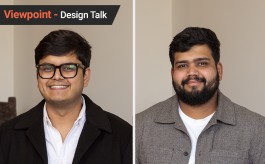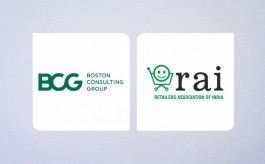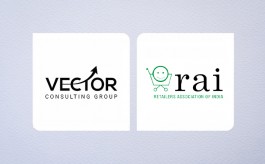Home » Viewpoints » Collaboration, the key to retail success
Collaboration, the key to retail success
By Fairy Dharawat | May 24, 2013
Stephen Roberts -- Head of the Store Planning division of Bentel Associates International, shares his insights on the Indian market, the challenges of being here and why he prefers Indian clients.
 Bentel Associates International (BAI) established in 1960, is one of South Africa's leading retail architecture firms, with more than 50 years of rich experience. It has been on the forefront of designing shopping centres and has pioneered the "Theme Centre" concept. In 2004, the ICS Group recognised the need for specialised architectural services in the retail real estate and mixed used developments in India. To capitalise on this opportunity, ICS Group partnered with Bentel Associates International (BAI) to represent them in India. Bentel India is headquartered in Mumbai and has a fully operational design studio. It is currently one of India's leading retail architectural firms involved in designing projects covering over 40 million square feet, which includes retail projects, IT parks, hotels and mixed use developments.
Bentel Associates International (BAI) established in 1960, is one of South Africa's leading retail architecture firms, with more than 50 years of rich experience. It has been on the forefront of designing shopping centres and has pioneered the "Theme Centre" concept. In 2004, the ICS Group recognised the need for specialised architectural services in the retail real estate and mixed used developments in India. To capitalise on this opportunity, ICS Group partnered with Bentel Associates International (BAI) to represent them in India. Bentel India is headquartered in Mumbai and has a fully operational design studio. It is currently one of India's leading retail architectural firms involved in designing projects covering over 40 million square feet, which includes retail projects, IT parks, hotels and mixed use developments.In a freewheeling one-to-one with VM&RD, Stephen Roberts -- Head of the Store Planning division of Bentel Associates International, shares his insights on the Indian market, especially in the context of shopping centres and malls, the challenges of being here and why he prefers Indian clients.
Coming to India - The expectations and the reality
We came to India as experts in retail design. Today we have completed many retail projects in India and have worked on a combination of retail commercial projects and hospitality and over the years we have found the retail India scene changing . On the development side, we have seen steady progress and the Indian retail industry has become more sophisticated. But we find that shopping centres take a long time to be completed and that it needs a lot more sophistication and management.
When we entered India we were promised 8 million square feet of retail space in a couple of years. I think it was a very high expectation and it did not materialize. After the first two three years, we realized that it was going to be a long process. Nonetheless, we were always optimistic about it as we are seeing improvements every year. The last two -three years' financial recession apart, India's growth has not been affected. Right now we are very happy that our expectations have become much more realistic. We know now that there will be lot of hard work in store for us and we are happy to be here.
The challenges
There have obviously been hurdles while working in India and we learned to work in that environment. I find that the issues are more or less the same when starting out in both countries - South Africa and India. The history of retail in India is similar to the retail history of the world as similar challenges and difficulties needs to be faced. This will eventually work out as we are already seeing it working out.
There are concerns - especially from high street tenants and shoppers. But I think history proves that there is a benefit for everybody. High street shopping still provides convenient shopping and there will always be convenient shopping. Also, we concentrate on tier one cities and we need to go beyond that. Besides, there are still going to be a lot of cultural and financial challenges which needs to flatten out. But we have the advantage of having established a local office in Mumbai. A combination of our expertise and that of the local architect enables us to find the right solution. We depend very much on local knowledge and the regulations and this partnership is the source of our victory.
The Indian advantages
We find it extremely exciting that the Indian client is willing to learn, listen and adapt. We come from a country where the clients think that they know everything. In India when they say "yes" you have something to offer; it is exciting to work in that environment. I also find that the Indian developers are willing to adapt.
We are also amazed at the amount of marble and granite workmanship and craftsmanship which exists in this country. These together can produce craftsmanship that we would never even attempt in a developed country. Also, in India people are more concerned about the big picture which should be the case unlike in the West where people are concerned about accuracy.
Foreign investments in India
The introduction of foreign brands is necessary for developing the Indian industry. If major international tenants come in, it's going to help in variety and in the planning of retail moves in the country. We have to know their requirements and limitations and we need to make allowances for these in the initial planning. These changes are slow in nature and will take place gradually. There won't be a major influx, but I am pretty confident that it will increase.
Sustainability in the Indian context
Sustainability has become a big issue worldwide but from the design point of view we can select materials which are environmentally friendly. You always have to see the additional cost that is introduced in the sustainable and energy efficient elements and compare it against benefits to your operational cost and this is where the challenge comes. India has the opportunity as most of the developers are looking for long term investment and they will be open to suggestions. It is also going to matter how many local authorities will legislate, and are willing to adapt to changes. An energy efficient building is a worldwide issue; we need to be frugal. We have built one in Thane and Navi Mumbai where we have used a lot of lights.
Tenants and developers need to get together and work as a team. Developers, tenants, builders, designers, the mall management teams and others need to understand that this is a collective teamwork.
Looking ahead
We are looking to expand our office in Mumbai and are planning a branch office in Bangalore and/or in Kolkata to cater to the market needs. When the time is right, we are also planning to expand our Indian operations to the Middle East.
The decision to come to India happened by chance, but we are very thankful to be here. People in India are fantastic. India needs to work on its practical side but we are becoming a lot more sophisticated now and I am very happy to be here. I love coming to India; it is a second home to me.
Advertisement
Related Viewpoints
Advertisement









Comments